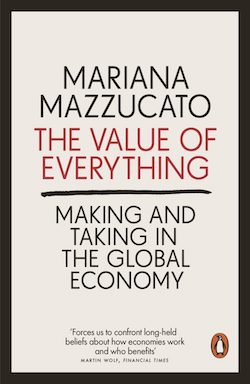Throughout the history of economic thought, government has long been seen as necessary but unproductive, a spender and regulator, rather than a value creator.
Actors in both the financial sector and Silicon Valley have been particularly vociferous in their self-aggrandised claims about wealth creation, using these claims to lobby for favourable treatment that has in turn enabled them to reap rewards disproportionate to the value they actually created. By the same token, others have widely but mistakenly been regarded as “unproductive”.
Does government create value?
The narrative that government is inefficient and its optimum role should be “limited” to avoid disrupting the market is extremely powerful.
At best, the story goes, government should simply focus on creating the conditions that allow businesses to invest and on maintaining the fundamentals for a prosperous economy: the protection of private property, investment in infrastructure, the rule of law, an efficient patenting system.
After that, it must get out of the way. Know its place. Not interfere too much. Not regulate too much. Importantly, we are told, government does not “create value”; it simply “facilitates” its creation and – if allowed – redistributes value through taxation.
Such ideas are carefully crafted, eloquently expressed and persuasive. They have resulted in the view that pervades society today: government is a drain on the energy of the market, an ever present threat to the dynamism of the private sector.
But while this is the accepted view of government’s role, a brief glance at the history of capitalism reveals some other powerful, if less simplistic, stories about government’s place in the economy.
The market and the state
In the middle of the Second World War Karl Polanyi, a radical Austro-Hungarian thinker who combined the reasoning of political economy with a deep understanding of anthropology, history and philosophy, wrote a very important book: The Great Transformation.
In it, he argued that markets were far from “natural” or inevitable — rather, they resulted from purposeful policymaking: “The road to the free market was opened and kept open by an enormous increase in continuous, centrally organised and controlled interventionism . . . Administrators had to be constantly on the watch to ensure the free working of the system”.
Polanyi traced the long history of local and international markets. In the process, he showed that the national capitalist market — the one studied in economics classes with supply and demand curves — was actually forced into existence by the state. Government, Polanyi asserted, does not “distort” the market. Rather, it creates the market. Put bluntly: no state, no market.
The prevailing view of government is wrong and is more the product of ideological bias than anything else
This is not a normative point – the government can of course invest in areas that are considered problematic, from wartime technologies to fracking technology, which some have argued strongly against. And it is precisely this potentially powerful role that should alert us all to better understand what tax-payers’ money (or printed money) is being invested in.
Common sense
Government policy has been crucial to envisioning and funding key technologies such as the Internet, critical to Silicon Valley’s success. In the process, government has given life to new markets that have sprung from these technologies (the dot.com economy).
The prevailing view of government is wrong and is more the product of ideological bias than anything else. The stories told about government have undermined its coincidence, limited the part it can play in shaping the economy, undervalued its contribution to national output, wrongly led to excessive privatisation and outsourcing, ignored the case for the taxpayer sharing in the rewards of a collective — public — process of value creation, and enabled more value extraction.
Yet these stories have become accepted as “common sense” — always a term to be treated circumspectly. We have become accustomed to much talk about the pros and cons of austerity.
The debate about government, though, should not be about its size or its budget. The real question is what value government creates — because to ask about the role of government in the economy is inevitably to question its intrinsic value. Is it productive or unproductive? How do we measure the value of government activities?
This excerpt is taken from a new book, The Value of Everything, by Mariana Mazzucato, professor of the Economics of Innovation and Public Value at University College London and director of the Institute for Innovation and Public Purpose.

The book “The Value of Everything” was published in April 2019 by Penguin.
This piece originally appeared on Apolitical, the global network for public servants. You can find the original here.
